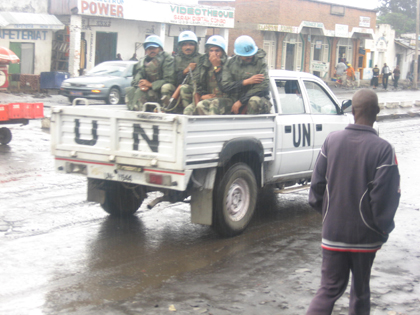The UN System: Is it value for its money?
Feb 21, 2008

Above: UN soldiers in Goma in DR Congo on November 17th, 2007. Photo credit: Foufou Hakizimana/Tiziano Project
The irony can never be missed; the megalomaniac budgets are what infuriate the wretched that it is supposed to be looking after. Poetically, that can describe the United Nations system in its practical relations with the masses. From the onset of independence when the United Nations failed miserably during the Congo crisis in the 1960's up to its slowness in Darfur at present, Africa has got a raw deal. In the United Nations, the African peoples have always expected much but gotten less.
President Paul Kagame of Rwanda once told a news conference, that he likewise couldn't understand why the UN system was spending so much money just keeping peace when they couldn't help creating the peace. He wondered how much that amount of money would achieve if given to locals to build conditions necessary for long term stability. The billions spent trying to establish conditions and managing the poor.
The UN Congo mission known as Monuc spends a whopping one billion dollars per annum according to official figures and yet a major humanitarian crisis remains in the province of North Kivu with thousands of people displaced. The Monuc soldiers typify the tragedy that is the United Nations administrative structure. The core task of disarming the genocide machinery - Interahamwe called FDRL of Ignace Murwanyashaka remains undone. The fact that the presence of the Interahamwe on Congolese soil is the prime reason the entire Great lakes region faced multiple conflicts. Instead many officers serving with Monuc have been accused of serious sex offences according to BBC reports from July 2005.
In Rwanda's case, the achievement of the International Criminal Tribunal for Rwanda [ICTR] based in Arusha Tanzania remains a point of serious contention. Having been established to try the masterminds of the 1994 genocide, the tribunal has managed to conclude just over thirty cases at a financial cost in excess of one billion US dollars [$1bn] according to Tim Gallimore spokesman for ICTR.
Whilst looking at how the international system works in Africa, one can't avoid referring to Graham Hancock's book, Lords of Poverty; the Power, Prestige, and Corruption of the International Aid Business. He talks extensively against the UN and its subsidiary aid organization that are more into spending more money on self perpetuation than matched by their ability to do any real good. Imagine during the famine of the late 1980's, Somalia was given huge supplies of slimming products and frostbite medicine.
The bureaucracy that is the United Nations is prone to incompetence that costs lives and wasteful spending of money. In many parts of Africa, their signature luxurious four wheel vehicles are an annoying presence amidst the poverty.
When the Karamajong region of Uganda was facing a famine, the World Food Program [WFP] led aid was gallons and gallons of cooking oil. The people just boiled the oil and consumed it, since no solid foods had been supplied. Inevitably, a worse disaster followed with many dying of the resulting poisoning.
Former secretary general Kofi Annan begun a much hyped reform process that aimed at making the prime world body more efficient and less corrupt. The panel set up by Annan recommended changes to achieve effective, efficient and equitable provision of peace for all in the 21st century. They proposed expanding the Security Council to 24 seats.
As expected, over the years, the major world powers that hold permanent seats have frustrated the expansion as they are bent on maintaining their dominant influence. It's true that the United States has called for reform especially in financial management demanding effective, result based management, and threatens to cut funding if not achieved. The US identifies areas needing reform as ethics, accountability, transparency, efficiency and accountability.
The western ethic greatly influences the thinking of most international organizations with a strong role in Africa effectively dictating how they approach African problems. There was great hope [and still is] that a more prominent role for the developing world on the UN security Council would change the outlook and make the body's activities in Africa more relevant. Remember at the height of the 1994 Rwanda genocide, the veto holding world powers, unwilling to commit their forces in an African quagmire, failed to make the obligatory intervention to stop the tragedy.
Albeit, it must be said that the UN system is not a complete failure; it emerges as the most present world forum for discussion of world affairs and humanitarian work. Having experienced life as refugees, many Rwandans have first hand experience of the services the more humane arms of the UN offer. The former UNHCR head Sadako Ogata is a hero to many Rwandans for her starring role during the refugee crisis in the aftermath of the 1994 genocide. The UN programs and original ideals of freedom, peace, development, public health and human rights remain all important.
The biggest weakness of the UN is that it is made up of many countries with unequal strength and differing interests. The Chinese interests in the Sudan have hindered a quick and viable solution to the Darfur conflict at the expense of the poor masses. The Chinese, who buy as much as two thirds of Sudan's oil and a major supplier of weapons to the Khartoum regime, play a leading role in defending their allies at the UN Security Council. Human rights activists are campaigning for a boycott of the Beijing Olympics to force China's hand on the Darfur issue. The now disbanded Human Rights commission failed because of this. The developing countries that have a lot to benefit from the works of the United Nations have the least say in major policy matters that affect them.
For the wretched masses, hope dictates patience; maybe greater service will come with reform.
Add your comment